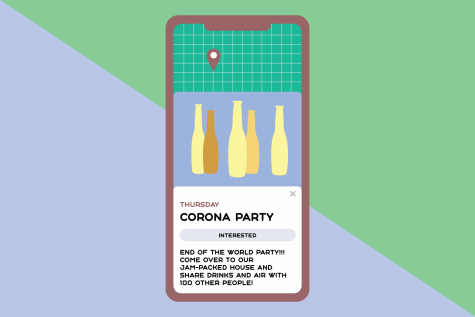As an immunosuppressed student, my peers let me down
Zach Brenner is a senior majoring in political economy and double-minoring in philosophy and religious studies.
In the critical few days following Tulane’s closure in March, it was clear that the coronavirus’ spread in New Orleans posed a serious threat to the vulnerable members of the community. Instead of engaging in a unified effort to maximize the safety of others, the actions and attitudes of many students placed the elderly and immunocompromised members of the New Orleans community at an even greater risk.
My own personal experience with a suppressed immune system prompted me to relate my story.
At only 22 years old, I am among those who are particularly vulnerable to COVID-19. I was diagnosed at age 13 with a chronic but treatable condition called Crohn’s disease. The treatment involves regular doses of immunosuppressive drugs, weakening my ability to fight off viral and bacterial infections.
Naturally, the weeks preceding the community spread in New Orleans were already filled with anxiety. However, even as the first three cases were confirmed in Louisiana, I thought that with extra safety precautions I would be fine on campus in the impending months.
I reckoned that as long as an overwhelming percentage of Tulane’s students responded to the threat and practiced social distancing, campus would be relatively safe.
It was nearly impossible to retain this optimistic outlook in light of how I saw my social circles react to the news of Tulane’s campus-wide evacuation. There was a general sense of panic, and, understandably, many of us were concerned about leaving our friends so abruptly.

For seniors, this feeling was especially poignant. In what appeared to be a lack of respect for the weight of the situation, my phone notified me of multiple celebratory Facebook events being posted — mostly impromptu end-of-the-freaking-world parties, and bars advertising “all night” happy hours.
Either people were unaware or chose to deny the severity of large gatherings at that critical time.
I questioned whether the virus would be taken seriously enough by those around me. Counting on more appropriate responses to this potential crisis was no longer a safe bet, so I booked a flight for the next morning. Ahead of what might be an escalating curve of transmitted infections, I still clung to the hope that I was overreacting, and maybe leaving was indeed the wrong decision.
I was devastated the next morning when I checked my phone on the plane.
The bars and campus groups that had been advertising events were overrun with students gleefully posting on social media, and still some new events were popping up. All of this transpired while cases of the virus were already confirmed in New Orleans, and the number of infected was likely greater than what had been reported.
As painful as it was to see the degree of naivety that existed, it was the jokes that were mind-blowing.
“Hey, if I’m gonna die, might as well die in NOLA than at home.”
“Fuck Corona, Tulane can’t get any sicker!”
“You’ll have to drag me away from here.”
While I don’t believe anybody intended to cause harm, the humorously cavalier attitude that those bar-goers temporarily adopted felt unfair. I recognize the desire to emotionally normalize circumstances in order to deal with them, but not when that conduct invites peril — much like the spring break devotees sunning on the beaches in Florida.
The flu-like virus may not have been sufficiently scary to the jokesters, but to myself and others more vulnerable to health issues, the threat deserved thoughtful consideration. Our concerns were dismissed.
Since the day Tulane closed, the virus has continued to grow exponentially in Louisiana. Flattening the curve still remains a paramount goal. I’m sure the vast majority of Tulane students are now staying home and social distancing.
I hope that students everywhere will commit to fighting this pandemic together, because there are many of us who need you.
Finally, I should reflect on the fact that I am in a privileged position. There are many who cannot leave as quickly as I did, and many who may not have a safe place to return home.
So while I feel obligated to tell this story as someone with underlying medical issues, I hope others like me who may feel alone and frustrated with the response of some of their friends and community will take some solace in reading this and know that many identify in their plight.
Your donation will support the student journalists of Tulane University. Your contribution will allow us to purchase equipment and cover our annual website hosting costs.



Justin • Apr 2, 2020 at 5:08 pm
Fantastic article Zach. Although I am not in the same position as you, I was disgusted at how Tulane students reacted to this news and how some individuals STILL act selfishly. This virus is no laughing matter and something to downplay. I pray this all ends quickly and we can go back to our normal lives again.
Ann • Apr 1, 2020 at 1:32 pm
Zach, thank you for speaking your mind about this. I am sorry we couldn’t have done more to support you and others in similar positions. I can’t say if it was denial or apathy, but I don’t know if it even matters. We should have known better.